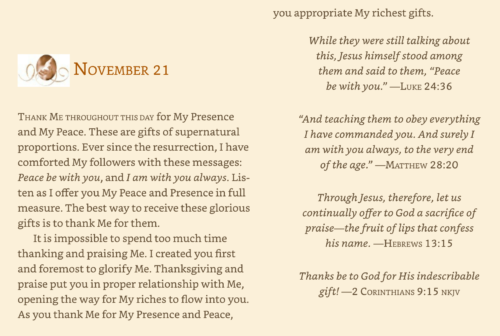An Attitude of Gratitude
Father Richard Rohr reminds us that when we receive everything as a gift, we can live gratefully, allowing the energies of life and love to flow through us to the benefit of the whole.
In Philippians 4:6–7, Paul sums up an entire theology of prayer practice in very concise form: “Pray with gratitude, and the peace of Christ, which is bigger than knowledge or understanding [that is, making distinctions—Richard], will guard both your mind and your heart in Christ Jesus.” Only a pre-existent attitude of gratitude, a deliberate choice of love over fear, a desire to be positive instead of negative, will allow us to live in the spacious place Paul describes as “the peace of Christ.”
It is important that we ask, seek, and knock to keep ourselves in right relationship with Life Itself. Life is a gift, totally given to us without cost, every day of it, and every part of it. A daily and chosen attitude of gratitude will keep our hands open to expect that life, allow that life, and receive that life at ever-deeper levels of satisfaction—but never to think we deserve it. Those who live with such open and humble hands receive life’s “gifts, full measure, pressed down, shaken together, and running over into their lap” (Luke 6:38). In my experience, if we are not radically grateful every day, resentment always takes over. Moreover, to ask for “our daily bread” is to recognize that it is already being given. Not to ask is to take our own efforts, needs, and goals—and our selves—far too seriously. Consider if that is not true in your own life.
All the truly great persons I have ever met are characterized by what I would call radical humility and gratitude. They are deeply convinced that they are drawing from another source; they are instruments. Their genius is not their own; it is borrowed. We are moons, not suns, except in our ability to pass on the light. Our life is not our own; yet, at some level, enlightened people know that their life has been given to them as a sacred trust. They live in gratitude and confidence, and they try to let the flow continue through them. They know that “love is repaid by love alone,” as both St. Francis of Assisi and St. Thérèse of Lisieux have said.
In the end, it is not our own doing, or grace would not be grace. It is God’s gift, not a reward for work well done. It is nothing for us to be boastful about. We are God’s work of art, created in Christ Jesus. All we can do is be what God’s Spirit makes us to be, and be thankful to God for the riches God has bestowed on us. Humility, gratitude, and loving service to others are probably the most appropriate responses we can make.
Sharing God’s Grace
For author and historian Diana Butler Bass, gratitude begins with awareness of God’s grace:
The words “gratitude” and “grace” come from the same root word, gratia in Latin. . . . “Grace” is a theological word, one with profound spiritual meaning. Grace means “unmerited favor.” When I think of grace, I particularly like the image of God tossing gifts around—a sort of indiscriminate giver of sustenance, joy, love, and pleasure. Grace—gifts given without being earned and with no expectation of return—is, as the old hymn says, amazing. Because you can neither earn nor pay back the gift, your heart fills with gratitude. And the power of that emotion transforms the way you see the world and experience life. Grace begets gratitude, which, in turn, widens our hearts toward greater goodness and love.
Bass explores the liberating nature of gratitude:
Together grace and gratitude form a different moral “equation.” The standard model of gratitude is a closed cycle of gift and return bound by social obligation and indebtedness, whereby a “benefactor,” a superior of some sort (someone wealthier, more powerful), provides a benefit for another, a “beneficiary,” a person in a state of need or trouble. In the closed cycle, the beneficiary is dependent on the benefactor in a way that feels demeaning or signals indebtedness. . . . Few want to be on the receiving end of an unequal transaction. . . .
If we change a closed system to an open one, banishing transaction and substituting grace, the picture of gratitude shifts. In the closed cycle of debt and duty, the roles of benefactor and beneficiary are static, and gifts are commodities of exchange, based in transaction and control. . . . But in an open cycle of gratitude, gifts are not commodities. Gifts are the nature of the universe itself, given by God or the natural order. Grace reminds us that every good thing is a gift—that somehow the rising of the sun and being alive are indiscriminate daily offerings to us—and then we understand that all benefactors are also beneficiaries and all beneficiaries can be benefactors. All that we have was gifted to all of us. There would be no benefactors if they were not first the recipients of grace. In other words, gifts come before givers. We do not really give gifts. We recognize gifts, we receive them, and we pass them on. We all rely on these gifts. We all share them.
This is not a fulfillment of duty or a single act of kindness, but an infinite process of awareness and responsive action. The gift structure of the universe is that of an interdependent community of nature and neighbor that extends through the ages in which we care for what was handed to us and give gifts to others as a response. This is not a closed circle of exchange; it is more like the circles that ripple across a pond when pebbles are tossed into the water.
